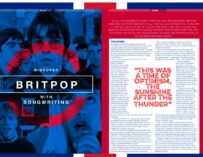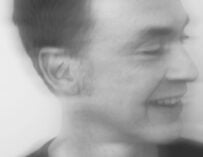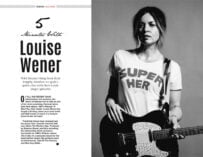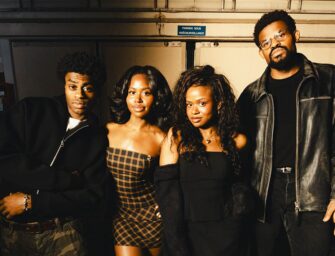We got to know the Salford-born singer-songwriter who you’ll recognise as the frontman of British indie rock band The Charlatans
Singer, songwriter and label owner Tim Burgess burst onto the indie music scene with his group The Charlatans in the late 80s and – riding the rampant waves of Madchester, shoegaze, and Britpop that swallowed up many of his contemporaries – enjoyed an illustrious career that continues to this day.
With Tim leading the line, all 13 of The Charlatans’ studio albums have charted in the Top 40 of the UK Albums Chart, and three of them made the top spot. They’ve also chalked up 22 Top 40 singles and four Top 10 entries in the UK Singles Chart, including the hits The Only One I Know and One To Another.
Even though the band was still going strong, Tim managed to forge a successful solo career, starting with his debut LP I Believe in 2003 and culminating in 2018’s As I Was Now that was recorded 10 years earlier. He even found the time to launch his own record label O Genesis in 2011, and has enjoyed collaborating with a diverse collection of artists including Peter Hook, Saint Etienne, Kurt Wagner and even modern classical composer Peter Laurence Gordon.
We found Tim relaxing at his new home in Norfolk and took the opportunity to reflect on his knack for songwriting with the band and on his own…
Looking back through The Charlatans discography, it’s clear that songwriting is a band effort – everyone gets a co-writing credit on pretty much every track. Was the songwriting process really that collaborative and has it always been like that?
“When we first started, Indian Rope was credited to everyone who was in the band at that time and I think The Only One I Know was as well. Then when we got to recording Some Friendly, we’d pretty much recorded the whole lot of it, and we had a lawyer! He came down and said, ‘Right, I want to divide everything up,’ and he kind of destroyed everything, for a second, because we had to really hone in on who did what. It was a lot more mysterious than that, so it seemed it a bit strange. But we went ahead and we divided it all up into parts of who did the most, and it was cool, but then we had a band member change – John Baker left and Mark Collins came in – and we had songs that we’d written in that shape that the lawyer suggested. Then after six months of working with Mark and feeling settled, we just agreed we’d split everything five ways.”
Do you know if that experience was typical of the time?
“I think it’s typical and I’m not in any way suggesting that [the lawyer] was wrong – he was probably doing his job – but we were working on a kind of magical thing! We’d been looking for each other all our lives and we came together and did something that we thought was fantastic, and then the outside world came in and divided it all up into sections. So then, after a while, we thought we’d go back to the way we thought it should be, and that’s what we’ve done since. Every song is different and every song allows someone to take the lead, and we like it to be a mystery to the listeners.”
Can you lift the lid on that mystery a little, and tell us how you might approach writing songs for a new album?
“In the early days, we’d all be in the same room together, sparking off each other. If a couple of members of the band really needed to concentrate and everyone else is just clowning around – we were only 22 years old! – the main people who were writing it would tell everyone to get out. That kind of faded over time, and experience, and with us being around for longer. I always found writing with Mark very exciting, and I found it very easy to concentrate. Rob [Collins] and Martin [Blunt] used to write separately and come in with a lot of instrumental stuff, which was also very exciting, and that’s been a bit of a tradition with the band. Although, with Wonderland I really enjoyed writing with Tony [Rogers, who replaced Rob Collins] on that one.”
Was that a conscious decision to do things different with each new album, or were you simply keeping the momentum going by sticking with a tried and tested approach?
“There’s been times when we’ve kind of forced a change. On the occasion with Wonderland, I think Mark and Tony volunteered to come out and write with me in Los Angeles, and Tony got the bit between his teeth, musically, and we were bouncing off each other quite well, at that point. But it changes and nobody knows how it’s going to work out, so we just tried to let it reveal itself, in a way.”
With Tellin Stories, in retrospect, it’s easy to see how that collection of songs became a really strong and cohesive LP. When you were making that album, did you have any idea it would be so good?
“I have to begin with The Charlatans album, the one before. Our third single Just When You’re Thinking Things Over got quite a lot of radio play and was a hit, then the album came out and went to No 1, and I think that surprised a lot of people. There was then talk of having another single off it, but we decided not to do that and to go back into the studio. We went into Rockfield and recorded One To Another, North Country Boy and How High, and they were the first three songs [on Tellin Stories]. They were kind of written after the euphoria of having a No 1 album.”
Do you think that was because of the confidence you had?
“Absolutely, yeah. In a way, Up To Our Hips was the beginning and Tellin’ Stories was kind of the third one – that’s the way I see it. We’d taken things back to being a band again, after trying to make an electronic record for our second album… which we did! I think Can’t Get Out Of Bed was a good start, then Just Lookin’ and Jesus Hairdo were building towards a sound that really came together with North Country Boy, and One To Another before that, when we also started a working relationship with The Chemical Brothers. We’d heard they were big fans of ours and I was going to Heavenly Social where they were resident DJs, so we struck up a friendship there and they worked on a few tracks on Tellin’ Stories. There was a lot going on and I like that when there’s a communal thing. Tom [Rowland] would come down to visit us, we’d take a break and go to London and go to The Social, and it felt like a really happening time for us – I mean, there was a lot going in music in Britain anyway, but that was our bubble.”
Did you feel like you were part of the whole Britpop scene?
“Well, I was living in Chalk Farm at the time and Britpop, for me, was happening in Camden, which doesn’t seem very far away – it’s about a mile away – but it seemed like quite a distance away to me. I liked it, I thought it was cool, but I always thought of Britpop as Blur, Suede and Elastica. At this point, I was going to Heavenly Social which was on Portland Street and hanging out on Wardour Street, and I made three albums in Wales, so I didn’t feel part of it but I was excited by it.”




































Related Articles